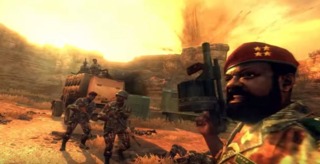Activision Facing Call of Duty Lawsuit Over "Barbarian, Halfwit" Depiction of Historical Figure
Black Ops 2 depicted Jonas Savimbi as a "barbarian" who "wants to kill everybody," his family says in new lawsuit.
Activision is facing another lawsuit related to the depiction of a real-life character in a Call of Duty game. The Guardian reports the family of former Angolan rebel leader Jonas Savimbi has filed a lawsuit against the mega-publisher over objections to their father's appearance in 2012's Call of Duty: Black Ops II.
In the lawsuit, three of Savimbi's children argue that Savimbi--the former leader of the National Union for the Total Independence of Angola--is depicted in Black Ops II as a "barbarian" and a "big halfwit who wants to kill everybody."
The family makes the case that Savimbi was in fact a "political leader and strategist." The family, who now live in Franchise, is seeking €1m in damages from Activision Blizzard's French arm.
An Activision Blizzard legal representative told The Guardian that the lawsuit is without merit. The publisher contends that Black Ops II depicts Savimbi as a "good guy," portrayed "for who he was … a character of Angolan history, a guerrilla chief who fought the [People's Movement for the Liberation of Angola]."
As you can see in the video above, Savimbi does in fact appear in Black Ops II. He's shown in an early section of the game, in which he leads a group--including the player character--in a battle against MPLA forces. In one section, he belts out, "DEATH TO THE MPLA!"

The real-world Savimbi was killed in 2002 in clash against Angolan government forces. As The Guardian explains, Savimbi was a controversial figure; 500,000 people died in the Angolan civil war and millions more were displaced.
This isn't the first time Black Ops II, developed by Treyarch Studios, has spawned a lawsuit involving a real-life figure upset with their representation in the game.
A similar case was brought against Activision last year from former Panamanian dictator Manuel Noriega, who claimed in a lawsuit that Activision used his name and likeness without permission in Black Ops II. Activision fought this lawsuit vigorously, hiring former New York City mayor Rudy Giuliani to help in its case.
The suit was ultimately dismissed, signalling a victory for Activision.
The publisher pushed so hard in part because because it claimed a win for Noriega could "open the floodgates" for other historical figures to sue over their depictions in games, movies, TV shows, and books. That's exactly what's happening here with Savimbi.
In the Noriega case, Activision never shied away from acknowledging that he did in fact appear in Black Ops II. But the publisher maintained from the beginning that the depiction of Noriega in Black Ops II represents "transformative" use, and is thus protected free speech under the First Amendment.
It seems likely that Activision could use the same argument in the case involving Savimbi.
Got a news tip or want to contact us directly? Email news@gamespot.com
Join the conversation